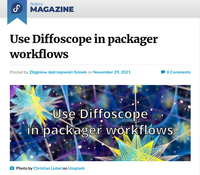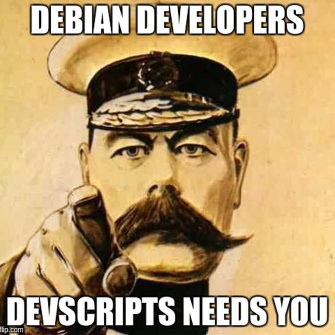Simon Josefsson: Validating debian/copyright: licenserecon
Recently I noticed a new tool called
licenserecon written by Peter Blackman, and I helped get licenserecon into Debian. The purpose of licenserecon is to reconcile licenses from debian/copyright against the output from licensecheck, a tool written by Jonas Smedegaard. It assumes DEP5 copyright files. You run the tool in a directory that has a debian/ sub-directory, and its output when it notices mismatches (this is for resolv-wrapper):
# sudo apt install licenserecon jas@kaka:~/dpkg/resolv-wrapper$ lrc Parsing Source Tree .... Running licensecheck .... d/copyright licensecheck BSD-3-Clauses BSD-3-clause src/resolv_wrapper.c BSD-3-Clauses BSD-3-clause tests/dns_srv.c BSD-3-Clauses BSD-3-clause tests/test_dns_fake.c BSD-3-Clauses BSD-3-clause tests/test_res_query_search.c BSD-3-Clauses BSD-3-clause tests/torture.c BSD-3-Clauses BSD-3-clause tests/torture.h jas@kaka:~/dpkg/resolv-wrapper$Noticing one-character typos like this may not bring satisfaction except to the most obsessive-compulsive among us, however the tool has the potential of discovering more serious mistakes. Using it manually once in a while may be useful, however I tend to forget QA steps that are not automated. Could we add this to the Salsa CI/CD pipeline? I recently proposed a merge request to add a wrap-and-sort job to the Salsa CI/CD pipeline (disabled by default) and learned how easy it was to extend it. I think
licenserecon is still a bit rough on the edges, and I haven t been able to successfully use it on any but the simplest packages yet. I wouldn t want to suggest it is added to the normal Salsa CI/CD pipeline, even if disabled. If you maintain a Debian package on Salsa and wish to add a licenserecon job to your pipeline, I wrote licenserecon.yml for you.
The simplest way to use licenserecon.yml is to replace recipes/debian.yml@salsa-ci-team/pipeline as the Salsa CI/CD configuration file setting with debian/salsa-ci.yml@debian/licenserecon. If you use a debian/salsa-ci.yml file you may put something like this in it instead:
--- include: - https://salsa.debian.org/salsa-ci-team/pipeline/raw/master/recipes/debian.yml - https://salsa.debian.org/debian/licenserecon/raw/main/debian/licenserecon.ymlOnce you trigger the pipeline, this will result in a new job
licenserecon that validates debian/copyright against licensecheck output on every build! I have added this to the libcpucycles package on Salsa and the pipeline contains a new job licenserecon whose output currently ends with:
$ cd $ WORKING_DIR /$ SOURCE_DIR $ lrc Parsing Source Tree .... Running licensecheck .... No differences found Cleaning up project directory and file based variablesIf upstream releases a new version with files not matching our
debian/copyright file, we will detect that on the next Salsa build job rather than months later when somebody happens to run the tools manually or there is some license conflict.
Incidentally licenserecon is written in Pascal which brought back old memories with Turbo Pascal back in the MS-DOS days. Thanks Peter for licenserecon, and Jonas for licensecheck making this possible!
 Last weekend was the bi-annual time to roll the main machine and
server to the current Ubuntu release, now at 23.04. It must now have
been fifteen or so years that I have used Ubuntu for my desktop / server
(for reasons I may write about another time). And of course it all
passed swimmingly as usual.
[ And a small aside, if I may. Among all these upgrades, one of my
favourite piece of tech trivia that may well be too little known remains
the dedication of the PostgreSQL maintainers installing the new version,
now PostgreSQL 15, seamlessly in parallel with the existing one, in my
case PostgreSQL 14, keeping both running (!!) on two neighbouring ports
(!!) so that there is no service disruption. So at some point, maybe
this weekend, I will run the provided script to dump-and-restore to
trigger the database migration at my convenience. Happy PostgreSQL on
Debian/Ubuntu user since the late 1990s. It. Just. Works. ]
[ Similarly, it is plainly amazeballs how
Last weekend was the bi-annual time to roll the main machine and
server to the current Ubuntu release, now at 23.04. It must now have
been fifteen or so years that I have used Ubuntu for my desktop / server
(for reasons I may write about another time). And of course it all
passed swimmingly as usual.
[ And a small aside, if I may. Among all these upgrades, one of my
favourite piece of tech trivia that may well be too little known remains
the dedication of the PostgreSQL maintainers installing the new version,
now PostgreSQL 15, seamlessly in parallel with the existing one, in my
case PostgreSQL 14, keeping both running (!!) on two neighbouring ports
(!!) so that there is no service disruption. So at some point, maybe
this weekend, I will run the provided script to dump-and-restore to
trigger the database migration at my convenience. Happy PostgreSQL on
Debian/Ubuntu user since the late 1990s. It. Just. Works. ]
[ Similarly, it is plainly amazeballs how 
 Uhm yeah, so this shirt didn t age well. :) Mainly to recall what happened, I m once again revisiting my previous year (previous edition:
Uhm yeah, so this shirt didn t age well. :) Mainly to recall what happened, I m once again revisiting my previous year (previous edition: 







 Over the past days, I have received tons of positive feedback on my previous blog post about forming the Debian BBB Packaging Team [1]. Feedback arrived via mail, IRC, [matrix] and Mastodon. Awesome. Thanks for sharing your thoughts, folks...
Therefore, here comes a short ...
Heads-Up on the current Ongoings
... around packaging BigBlueButton for Debian:
Over the past days, I have received tons of positive feedback on my previous blog post about forming the Debian BBB Packaging Team [1]. Feedback arrived via mail, IRC, [matrix] and Mastodon. Awesome. Thanks for sharing your thoughts, folks...
Therefore, here comes a short ...
Heads-Up on the current Ongoings
... around packaging BigBlueButton for Debian:

 After:
After:



 DebConf4
This tshirt is 16 years old and from DebConf4. Again, I should probably wash it at 60 celcius for once...
DebConf4
This tshirt is 16 years old and from DebConf4. Again, I should probably wash it at 60 celcius for once...

 Finally, DebConf4 and more importantly FISL, which was really big (5000 people?) and after that,
the
Finally, DebConf4 and more importantly FISL, which was really big (5000 people?) and after that,
the  Debian
devscripts
Before deciding to take an
Debian
devscripts
Before deciding to take an  Over the past 10 years, I've been a member of a dwindling team of people maintaining
the
Over the past 10 years, I've been a member of a dwindling team of people maintaining
the  In my
In my 
 Like
Like 